Although I can no longer recall with any certainty the first time I saw the name “Luke Goss” in the credits of a film, I can still remember my reaction: I executed a full-fledged double-take and thought, “Surely not the same Luke Goss who used to be a member of Bros…?”
Indeed it was.
Now, mind you, if you weren’t living in Europe or Australia during the late ’80s and/or early ’90s, it’s quite possible that you have no recollection of Goss’s early years as a pop star…which, all things being equal, is probably how he would prefer it, as he’s done an admirable job of leaving his music career behind, carving himself a nice little niche as a bit of an action star. But even in the midst of discussing his latest film, “Blood Out” (now on DVD), in which he co-stars with 50 Cent, Vinnie Jones, and Val Kilmer, there was never any chance that I wasn’t going to bring up Bros.
Ironically, though, it was Goss himself who gave me the perfect opening, and we had a good laugh about his pop star past during the course of our very pleasant chat, which also included discussion of his experiences working with Eugene Levy and Steven Seagal, the success of his American accent, the frustration of seeing one’s films go straight to video, and the challenges of achieving career longevity in such a climate.
(Fair warning: not to blatantly pimp my past work, but for a fuller picture of Goss and his career, it may behoove you to check out our 2008 conversation…partly because it’s referenced several times during this conversation, but mostly just because the man gives great interviews.)

Popdose: First of all, I don’t have any idea that you’d remember, but you and I have actually talked before, way back when ”Hellboy 2″ hit DVD.
Luke Goss: I thought so, actually! I recognized the names of several of the people I was going to be speaking to. It’s nice to be able to talk to people more than once, because it starts to feel more like you’ve having a regular chat.
So when I watched ”Blood Out,” you probably won’t be surprised that one of the first things that jumped out at me was that you were doing an American accent.
Yeah, and…I did that for ”“Death Race 2” as well, didn’t I?
I believe you did. How hard was it for you to cultivate the accent?
Well, I did a lot of theater when I was younger. When I first got into acting, I did four and a half years of theater before I did any film, and I… (Hesitates, then laughs) Uh, this is not in keeping with the kind of roles I’m doing now, but I did Danny Zucco in ”Grease” in the West End in London. That’s a different kind of accent, of course, but when I did ”Death Race 2,” it was funny, cause I went into the editing suite, where they were doing all the sound design and stuff, and the guys were, like, ”Hey, are you English?” I said, ”Yeah.” They said, ”Fuck, man, I didn’t know you were English!” Cause they’d been watching me for God knows how many weeks, but I’m on set and I don’t break character, so I was American even when I was talking to people on the set. So they were surprised. But I like doing it. I think also if you keep mixing it up…like, I meet people who don’t know so much about me and some people who do, but the people that don’t are, like, ”Are you English or American?” And I think that’s a good question at that point.
With ”Blood Out,” you’ve got a revenge flick, which automatically equals lots of action…
(Laughs) It goes hand in hand, right?
It does. But as a Brit, can you speak to the handling differences between a baseball bat and a cricket bat?
Mate. Why do you think I live here (in the States)? The cricket bat can go head off into the sunset on the horse it rode in on. It’s not a weapon of choice for me. (Laughs) There’s something not terribly sinister about a cricket bat, do you know what I mean? ”I’ll kick your ass…with a cricket bat.” You can’t say that! Plus, it’s cricket, so you’ve got to pad up and all that.
Not quite the same.
No.
You spent some time tooling around on the motorcycle in the film.
Yeah! I loved that!
What’s your history with motorcycles?
When I was a kid, I was in a band, and some of the perks of that were motorbikes. When I was recording one of my albums when I was a kid…I don’t know, 22 or so…we were in the south of France, and I used to go up the side of these mountains and along these vineyards all the time. I did this endorsement deal with Yamaha, so they sent over a load of quads and bikes to say ”thank you.” I thought the fee for doing the ad campaign was enough, but they sent over some bikes to say ”thanks,” and we used them to the max. There were injuries — cut faces and a bunch of other stuff — but we had a lot of fun with the bikes. I love being on a bike. I mean, I prefer being on a horse, but I like riding bikes.
Okay, now, you’ve totally played off the ”I was in a band” thing, and that’s cool, but…look, I’ve got Push (by Bros) on cassette, man, so you’re not fooling anyone here.
(Bursts out laughing) Good God, man! Bloody hell, I don’t even have a copy of that! Shit! Look, y’know what it is? I think if you’re ever going to make that kind of music, you’d better do it when you’re, like, in your teenage years or your very, very early 20s, cause otherwise you’ve got no excuse. I just about made it, I think. (Laughs) But where are you from, though?
I’m from America. Norfolk, Virginia.
Okay, cause I think we only sold about three or four thousand units in the States. So you’re one of them, then, eh?
I am. And I’ve since upgraded the cassette to a CD, so I may even be two of them.
(Laughs) See, there’s a very big difference between American journalists and the ones in the UK, cause, for example, look at, like, say, Mark Wahlberg. You can truly reinvent yourself here. You can truly do that, and what you’ve done in the past can be embraced for the fun that it is or the beginning of a career that it is. There’s nothing more sinister than the Brits. I wish they had the ability to take it all as a package or as an evolutionary thing the way the Americans do. You’re allowed to have a career progression here. So it’s kind of nice that we can talk about the film, and we can also talk about how you’ve got a CD or a cassette of Push, and…well, anyway, it’s very refreshing, man.
Actually, you brought up Mark Wahlberg, but I was going to ask you if you’d had any discussion with 50 Cent about transitioning from music to acting when you worked with him on this film.
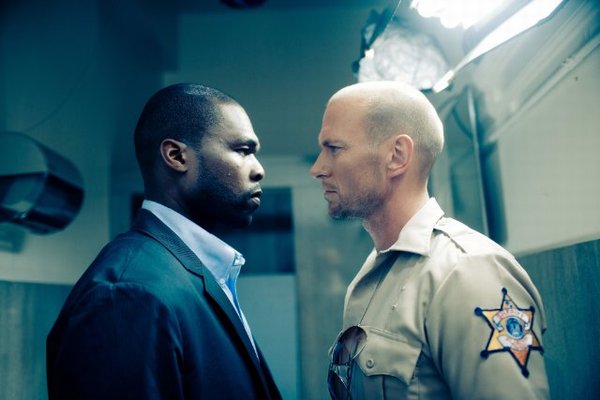
To be honest with you, I didn’t hang out with 50 a lot. The days that we were filming, it was pretty much just him and I doing what we were doing in the film, cause he’s not in it a great deal, but I was really, really impressed with Curtis’s commitment to the role. Like, we were improvising, but he definitely prepped for his time on set, and it was just really, really nice working with him. There was a definite connection there. At some point, I’d like to do a project, like maybe a two-hander, where it’s him and I doing something pretty hefty, cause I really enjoyed working with him. And…I don’t mean it in a patronizing way, but he was really prepared. He was ready to go. And we had a good time.
Working with Vinnie Jones must’ve been a treat for you, given that, as a Brit, you would’ve known him as a footballer before he was an actor.
I know Vinnie anyway, cause as Brits we kind of bump into each other. And I’m producing a bunch of stuff now, and he’s…not in this first one I’m doing, but probably for the next one, I’ll give Vinnie a call and say, ”Hey, d’ya want to come along and come hang out with us and do some work together?” I like Vinnie a lot. He’s a good guy. I mean, as far as an intimidating dude, the kind of character he plays, I can’t think of anyone who’s better at it.
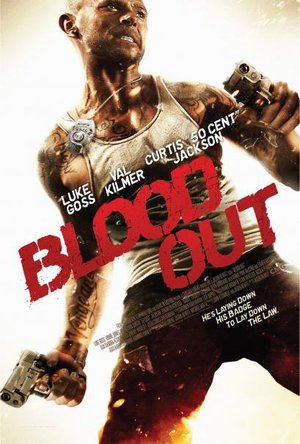
Speaking of intimidating characters, I wanted to ask you about the final battle of the film, when you’re up against the guy who’s all decked out metal warrior garb. Movie or not, it had to be daunting just standing in front of him while he’s looking like that!
Well, you know, what was more intimidating? Yes, it was, but I’ll get to that. In the screenplay…you know in the movie where they bring over the box of all that shit, and I say, ”Nah, I’m old school”? That was a negotiation point for me. I was, like, ”I love the story, but you’ve got as much chance of me wearing that metal warrior outfit as flying to the fucking moon.” (Laughs) I was, like, ”If I can maintain a sense of cool with the character and the audience at that point, I’ve got more abilities than I think I have. But I just don’t think it’s cool for me.” But I think it’s really great in the context of the film that we see the other guy in it, because he is like a warrior. He’s huge! And also an amazingly cool guy. A really nice guy. I said, ”You’re gonna help me kick your ass, is that right?” And he’s, like, ”Yeah, I’ll try my best!” (Laughs) I enjoyed it. I mean, I’m glad I didn’t have to wear the outfit, but I definitely liked that scene, because it just…my biggest concern was, ”Does it look feasible that I can do this?” And I think because of the wiry kind of energy that my character had and the intensity and what it’s driven by — his brother — I think anybody would believe at that point that, if you’ve got enough rage in you and you’ve got some ability, it’s feasible. My biggest concern when I looked at it back was thinking, ”Please let this translate like there was a chance at victory.” And it doesn’t seem too far-fetching by the end of it. The way it’s been shot and the energy…it’s not pretty, d’you know what I mean? It’s quite blunt. But I think it does register. But he was a big guy, for sure!
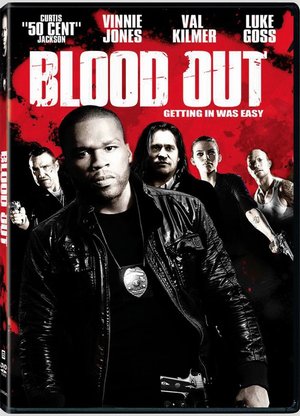
So how long was Val Kilmer actually on the set? Because, you know, he’s not really in it a whole lot.
Ah, a couple of days. And, actually, that was the front end of the shoot schedule, so I was on set for a couple of days with him, off and on for a couple of little fleeting seconds here and there. But I was obviously doing a lot of stuff on this film in a very short period of time, so I was pretty much just going from set to set to set. But all in all, everybody was really cool.
I’m supposed to talk to him on Monday, so I was just curious how he was to work with.
He’s…he seemed like a polite person. I mean, obviously, you know, everyone hears the stories about him being very intense or whatever, but from my experience, he was just polite and nice. He did his work and then got out of there, but he was very pleasant when I met him. Like, just genuinely polite. It’s nice when the myth is semi-busted, you know?
So the stigma of the straight-to-video film isn’t what it used to be, but do you ever get frustrated when a film goes that route? Or are producers more up-front about their expectations for films nowadays?
Well, there’s two different kinds of movies. You’re absolutely right, and, again, it’s really refreshing to hear that the industry is changing and people don’t realize necessarily that…like, there was some guy that left something on a message board the other day, and I said, ”Look, you’ve got to remember not every director has two and a half million bucks to play with, and if you love film, you have to stand up and walk the walk and not just talk it.” And I think with film, there’s a lot of filmmakers out there trying to keep the industry in great shape by just making a damned movie, as opposed to not making a movie. Absolutely people say, ”What made you choose this role? What made you choose that role? What made the director choose this project instead of another?” At the end of the day, unless you’re the guys who are getting millions and millions of dollars a movie, you have to kind of say, ”Do I like the story? Is it gonna be guerilla? Is it going to be crazy? Are we gonna work our asses off in the time we have? Yes. But do I want to make it? Do I want to at least try and achieve something?” So that’s what happens. You make a movie.
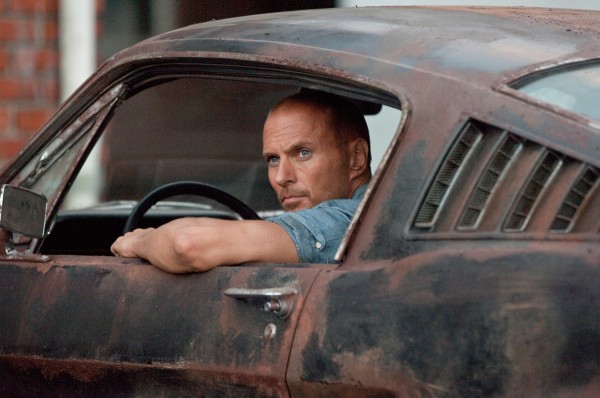
A prime example is ”Death Race 2,” where I know that everybody had wished that was theatrical, but it was always made for the video market. As opposed to, say, some movie that doesn’t turn out so well and it finds itself a DVD release, albeit a minimal one. As opposed to a movie that understands that its distribution is gonna be DVD, but they’re gonna try and make a feature film. I think what’s happening is that there are filmmakers out there that are making feature films regardless of the medium of which it’s presented to the audience. And this is one of those. You hope that it can have a limited release, but what’s happening is that the cost of releasing is getting higher and higher, and the profits that people are making off of DVDs is dictating whether the audience gets to see them on the big screen or not.
You’re fucking right I get frustrated, but I’m an actor, I love to act, I like trying to change shape. I know I’m not stereotypical in any sense as far as playing leading roles, so…it’s just an adventure for me. And I love it when I’m in a film that comes out theatrically and does well, but at the same time, I love acting and I love making characters, so I’m not going to stop and let it be dictated. I mean, agents are always telling you, ”Wait, wait, wait,” but then what do I do for a living? What, do I act sometimes? I don’t want to have that life. And sometimes you get people out there who have a release, and within a minute or two they’re making zillions of bucks, and they find themselves only in theatrically-released movies cause they’re being put together by studios. I think primarily I’m an independent filmmaker, so you kind of have to somewhat lay in the bed that you make. I’m always looking for that project that’s theatrical, but it’s getting harder and harder to find it, to be honest with you.
It’s funny: knowing that I was going to be talking to you, I had pulled a quote from an interview I did with one of your former co-stars, Michael Madsen, where he said, ”I believe in longevity, and I believe in doing this for as long as I can. I’ve got to take a job where I can get it. No studio is chasing me down the block. It’s a very aggressive, very competitive industry, and you’ve got to make it happen on your own or it’s not going to happen.”
Yeah, I mean, for me, I have to be lucky enough…like, I’m getting offered the front in movies quite a lot now. The next four movies I’m in, I’m the lead. And it’s not about ego. When you’re in that position, you get to roll with the director and have a creative day every single day, cause you have a say in the creative process. You have a rapport with the producers. That’s why I’m producing now: cause I don’t want to have to cross lines. I want to just be able to enjoy it. But the fact that I have that career…it’s like what Michael was saying, and it’s true. If you’ve got something that’s growing, are you just gonna leave it, or are you going to try to put as much into it as you can? I’m not saying it’s quantity over quality, but it is about saying, ”I’m going to stand by the acting and stand by the filmmaking and not let it be dictated purely by that hunger for a theatrical release and the adulation that goes with it.” It’s bloody nice when it happens, but it can’t be the motivator. It just can’t be. Not if you want longevity, and not if you just want to be able to enjoy being an actor or being a filmmaker.
The last time I talked to you, I asked you about your favorite project that hadn’t gotten the love you thought it deserved. At the time, you said it was a toss-up between ”Charlie” and ”Bone Dry.” Would you still say the same, or have you done anything since then to supplant either of them?
I think still the same, yeah, probably. ”Bone Dry” was one of those edgy independent movies where…well, like any of these things, it’s always a budgetary issue. A lot of the time, when the movies fall apart, it’s in the construction, the post-production stage, because there are deadlines and budgetary restraints on a lower-end film, and nine times out of ten I see kind of the result of that let a movie down in moments. And I think I can say that for ”Bone Dry” and a lot of the independent films I’ve done. I think, yeah, probably those two movies are the ones that didn’t get the attention they should have done.
I’ll go ahead and start the wrapping-up process with some one-liners. First, were there really ever any serious discussions about getting Bros back together in 2008?
(Laughs) Yeah, there’s lots, man. I’ve been offered a lot of deals over the years. I mean, a lot of deals…and very lucrative ones! But it’s, like, I love making films. I started late, I’m still a big kid about it. To be honest with you, I don’t know. Who knows if the day will come where it would feel like a fun thing to do? But at the moment, with the producing and writing I’m doing and all the other stuff, and some other cool announcements are about to happen with some projects, I just want to stick with this. But, yeah, we’ve had many, many offers to do it. And they’ve been legitimate offers.
I’m sure you could go Vegas like (your brother) Matt anytime you want.
(Laughs) I think he’s got that sewn up. He loves it, he knows it, he understands it. For me, I’d rather get some fake blood all over me, get oiled up, pumped up, and kick some ass. That’s what I love!
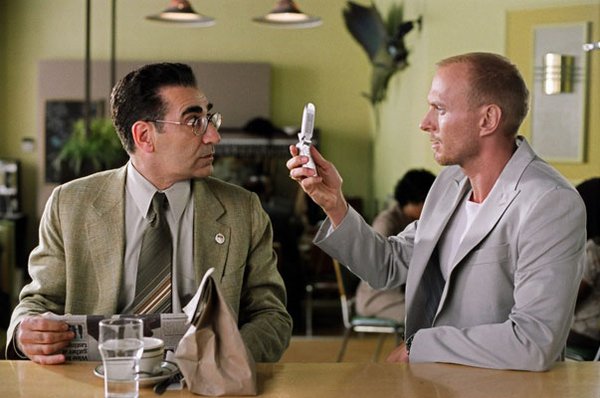
I’ve asked you before about the experience of working with Samuel L. Jackson on ”The Man,” but I never asked you what it was like to work with Eugene Levy.
I have to say, Eugene is one of those people that you just…if you could say, ”I really hope he’s like this…” Like, I met Michael Caine once and had that feeling: he was exactly like I’d hoped he would be. And Eugene is exactly the same. He’s a really lovely, really generous, unbelievably modest human being. He’s just a really lovely guy. I really, thoroughly enjoyed working with him. I think if I’d have spent longer in Canada and lived up there, I’d definitely want to have stayed in touch more than we have. But he’s a lovely, lovely guy.
This may be the flip side of that coin, but…what was it like working with Steven Seagal on “Mercenary for Justice”?
Steven, um… (Hesitates) Well, again, to me, he was very, very cool. I went to his house when I got the role for that. I actually went to his house, and we had a discussion about what role I wanted to play, and I remember hearing some of his demos. But just being his house, just on a pure geek level, regardless of what people think of him, I was thinking, ”Shit, I’m sitting here, hanging out with Steven Seagal in his house, talking about a new role. This is fucking cool!” (Laughs) And then we got to the set, and…I think more of the Seagal shows up when you get onto the set, but for me…I mean, it was in Africa, some of my personal team lives in Africa, so I was there and was just happy to be hanging out with my team and some of the people that I really care about, and it was done and dusted. But, yeah, there was some craziness, for sure. I can’t elaborate. (Laughs) Some of the rumors were true, I guess, but that’s as much as I can say about that. He’ll come and kick my ass if I say otherwise.
You’ve worked with David S. Goyer twice, but which came first: ”“ZigZag” or ”“Blade 2“?
It was ”ZigZag,” actually. That was one of those evolutionary things, where it was his directorial debut, as I’m sure you know. I actually just auditioned for that. It was an out and out audition. That was my first American movie that I ever made, and I went in the audition, and I hadn’t even got back to where I was heading…I was in the car when they offered me the part! My agent called and said, ”I don’t know what you did, but they just offered you the part!” It came in before I’d even made it from the audition to where I lived! So that was my first American film. And then David S. Goyer called Del Toro and said, ”I think we might’ve found our Nomak.” So then I met with Del Toro, read the script feverishly, and when I met with Del Toro, it was more a case of just…he wanted to have a conversation about Nomak. Cause it was so thin on the page, he didn’t want to audition. He just wanted to have a conversation, a discussion about, ”Who is Nomak?” So whatever I said seemed to work, cause I got offered that.
I love the fact that the call from Del Toro to offer you to the part in ”“Hellboy 2” began with him saying, ”Hey, motherfucker!”
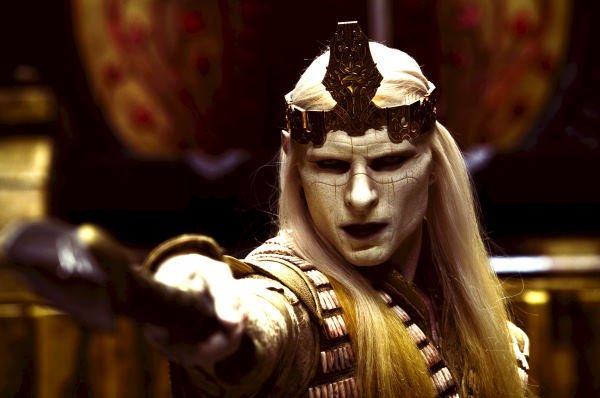
(Laughs) He did! And I said, ”Well, I know who this is…” I wasn’t expecting the call, because you just never know, but when I got that screenplay, that was truly, without a doubt, the easiest part I’ve ever landed. But that was with a great deal of help with Del Toro. I think at that point, it came with him standing his ground with Universal, saying, ”This is the guy I want,” so I owe him greatly for that. But, obviously, now, I’ve got my own great rapport with Universal, thanks to ”Death Race 2.”
I’ll close with this one: what’s the status on the film adaptation of ”Magdalena”? Because I know you’d been in talks for it for quite some time, but…
Yeah, I mean, to be honest with you, I don’t know. I think it’s one of those things where…I don’t know if it was a funding issue or whatever it was, but I don’t know anything about it now. It’s one of those projects that, even with an amazing producer like Gail Ann Hurd, it just for some reason has got to a point where it’s not a discussion for me at the moment. But, again, if it happens, I’d love to do it, because it really is a great project. So we’ll see.
Can you speak to what is next for you?
Well, there’s a movie that I’m going to be shooting in Hong Kong that I’ve written and produced with a couple of names that you will most definitely know…with me being the third name! And then there’ll be an announcement about a movie that I’ll be shooting in September, I think, but I can’t say anything more about that.
I’ll keep my ears open.
Please do. Good talking to you again, man!




Comments